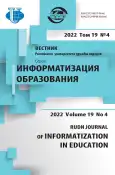Question and criterion method for assessing the quality of the organization’s digital educational environment
- Authors: Pak N.I.1, Syromyatnikov A.A.1
-
Affiliations:
- Krasnoyarsk State Pedagogical University named after V.P. Astafyev
- Issue: Vol 19, No 4 (2022)
- Pages: 312-327
- Section: DIGITAL EDUCATIONAL ENVIRONMENT
- URL: https://journal-vniispk.ru/2312-8631/article/view/321295
- DOI: https://doi.org/10.22363/2312-8631-2022-19-4-312-327
- ID: 321295
Cite item
Full Text
Abstract
It is of interest to create a technological, accessible and convenient method for evaluating multi-component and multi-dimensional educational systems, with the maximum share of automation and intellectualization of all related events. The purpose of the study is to substantiate the question and criterion method for assessing the quality of the digital educational environment of an organization based on mathematical methods of the theory of clustering and pattern recognition (using the example of monitoring the development of the digital educational environment of additional education practices for children). Methodology. The quality of educational systems or resources can be assessed using their inherent criteria, presented in the form of an information vector. The current values of these indicators determine the rating of a given system in a set of similar systems, and the dynamics of their changes over time shows the degree of development of each criterion sign. Monitoring sheets describing each system with an information vector represent a plurality of objects that can be clustered into certain classes. From a mathematical point of view, it is convenient to divide such systems into classes using a mining algorithm, and to take the metric of city blocks as a measure of the similarity of objects. Results. Monitoring of the organization's digital educational environment is carried out according to the functional characteristics of the environment based on the assessment of the organization's official website. According to the pyramid method, a question tree was developed on the functional components of the digital educational environment of additional education practices for children, according to which an information vector of the environment was formed, the values of which were determined by experts. Assessment of sites is carried out according to expert estimates in the automated system of competitive procedures “ASCO.” Conclusion. The proposed method allows monitoring the digital educational environment of an organization using mathematical methods of clustering theory and pattern recognition.
About the authors
Nikolay I. Pak
Krasnoyarsk State Pedagogical University named after V.P. Astafyev
Email: koliapak@yandex.ru
ORCID iD: 0000-0003-2105-8861
Doctor of Pedagogical Sciences, Full Professor, Head of the Department of Informatics and Information Technology in Education
89 Ady Lebedevoi St, Krasnoyarsk, 660049, Russian FederationAlexey A. Syromyatnikov
Krasnoyarsk State Pedagogical University named after V.P. Astafyev
Author for correspondence.
Email: syromyatnikov@kspu.ru
ORCID iD: 0000-0002-6439-4577
Candidate of Pedagogical Sciences, Associate Professor, Associate Professor of the Department of Informatics and Information Technologies in Education
89 Ady Lebedevoi St, Krasnoyarsk, 660049, Russian FederationReferences
- Kaptsov A, Kolesnikova E. Methodology for evaluating the educational environment of a university under the conditions of its digitization. Bulletin of Samara Academy for the Humanities. Series: Psychology. 2019;(2):147–154. (In Russ.)
- Konopatova NK. Assessment of the effectiveness of projects in the field of informatization of school education. Information Technology for the New School. Proceedings of the V International Conference. St. Petersburg: Regional'nyj Centr Ocenki Kachestva Obrazovaniya i Informacionnyh Tekhnologij Publ.; 2014. p. 21–25. (In Russ.)
- Dobudko TV, Gorbatov SV, Dobudko AV, Pugach OI. Methods of pedagogical institution electronic information and educational environment evaluation. Samara Journal of Science. 2018;(3):311–316. (In Russ.)
- Velizhanin MV. Theoretical foundations for assessing the quality of the information and educational environment of a comprehensive school. E-Scio. 2020;11(50):334–342. (In Russ.)
- Suhonen JA. Formative development method for digital learning environments in sparse learning communities (academic dissertation). University of Joensuu. Available from: http://epublications.uef.fi/pub/urn_isbn_952-458-663-0/urn_isbn_952-458-663-0.pdf (accessed: 27.06.2022).
- Shilova ON. Digital learning environment: pedagogical сomprehension. Man and Education. 2020;(2):36–40. (In Russ.)
- Sorokova MG, Odintsova MA, Radchikova NP. Scale for assessing university digital educational environment (AUDEE scale). Psychological Science and Education. 2021;26(2):52–65. (In Russ.) http://doi.org/10.17759/pse.2021260205
- Adolf VA. (ed.) Monitoring the development of the digital educational environment of additional education practices for children. Krasnoyarsk: Krasnoyarsk State Pedagogical University named after V.P. Astafyev; 2021. (In Russ.)
- Pak NI, Asaulenko EV, Grinberg GM, Myagkova EG, Khegay L. Digital environment of the department as a factor of future specialists’ professional information culture formation. International Journal of Applied Exercise Physiology. 2020;9(2):164–173
- Pak NI, Markovskaya IA, Narchuganov KN. Automated system of remote holding competitive and assessment procedures. Journal of Physics: Conference Series. 2020;1691(1):012156. http://doi.org/10.1088/1742-6596/1691/1/012156
Supplementary files









